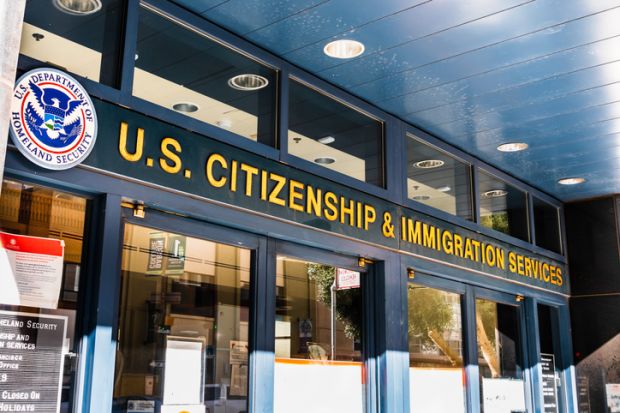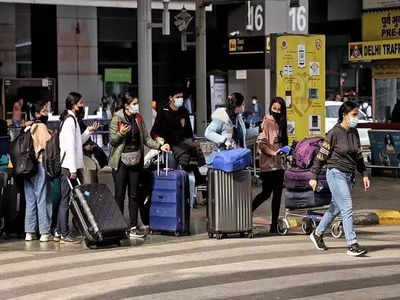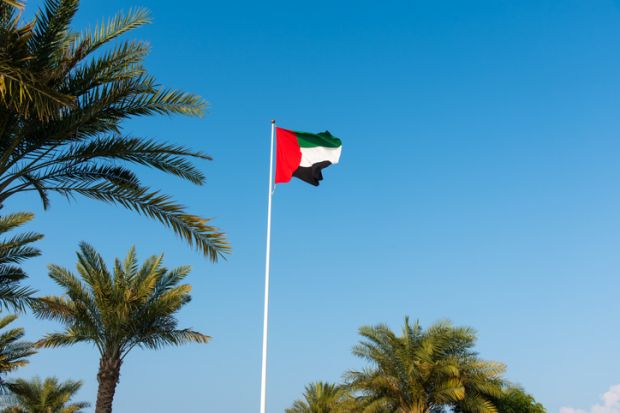
Canada announces international student enrolment cap levels for 2025
January 30, 2025
‘Phenomenal’ visa refusal rate for Indians hoping to study in US
February 6, 2025US and Indian authorities have refused to recognise that undocumented immigrants contribute to the host country’s economy. In January 2022, four members of a family, from the western Indian state of Gujarat, froze to death at the US-Canada border. The couple and their two children had paid a hefty amount to traffickers to be smuggled into the US for what they thought would be a better life. Instead, they perished in the cold.
Jagdish Patel, Vaishaliben and their children Vihangi and Dharmik were lured by
the promise of a prosperous life in the US, probably unaware of the perils on the
way. They were perhaps unaware of the hostile terrain that America presents to
the undocumented.
In the run-up to the US presidential elections, Donald Trump promised to deport
such undocumented/unauthorised immigrants, people he terms “illegal”. The US
has been “removing” “inadmissible or deportable” migrants since the 19th century,
but the deportation rhetoric has never before been stronger.
In 2022, Pew Research Center, a self-proclaimed non-partisan think tank,
estimated 725,000 unauthorised Indian immigrants living in the US, a number
second only to people from neighbouring Mexico and El Salvador. This number,
along with the 18,000 identified by the Indian administration as living ‘illegally’ in
the US, have often been referred to in news and discussions about the matter.
Various international organisations, including the United Nations High Commission
for Refugees, the UN General Assembly, the International Labour Conference, the Associated Press and other media have routinely pointed to the problems inherent
in the term ‘illegal’, advocating instead for words such as ‘irregular’ and
‘undocumented’.
Bogey of ‘illegal’ immigrants
But Indian government officials, the media and Trump routinely use the word
‘illegal’. It is also famously the favourite bogey of different ruling dispositions in
India, who regularly flag “illegal immigrants” as the reason behind everything –
from the so-called demographic shift to crime. In currency since the 1980s, Indian
politics has centred on ‘illegal Bangladeshis’ as an election issue, conducting
pushback operations and enacting new citizenship laws.
Paradoxically, the undocumented Indian in the US, in the eye of Trump’s antiimmigration storm, is likely to hit India hard.
The US is the second most popular global destination for Indians of all ilk, from
those holding H1-B temporary visas for highly skilled workers (in fields such as
software) to students and an ever-growing population of the undocumented living
on minimum wage.
Indians professionals received 72.3 percent of H1-B visas in the 2023 fiscal year,
while the number of irregular Indian immigrants arriving at a border or an airport
was 97,000. Both these figures indicate the continuing popularity of the US as a
favoured destination for Indians, bolstered by requirements in Silicon Valley, and
an ever-depreciating value of the rupee vis-a-vis the dollar.
The basic lacunae in both the Indian and the US governments’ responses has been
the inability to view undocumented workers as productive members of the host
community, as remittance earners back home and as people embedded in families
and kinship networks.
In the US, households led by undocumented persons paid US$ 75.8 billion in
taxes, indicating their contribution to the US economy. India received US$ 111
billion in remittances from documented and undocumented Indians from the US in
Irregular immigrants are more likely to send higher proportions of their
earnings back home, which, in simpler terms, translates into India benefitting
immensely from those who live undocumented in the US deportations are also set to wreak havoc in communities,
breaking apart thousands of mixed-status households and separating US citizen
children from their undocumented parents.
Far-reaching consequences
While India has already agreed to work with the US government to get 18,000
people it recognises as Indians back, the effects of the Trump administration’s
crackdown on immigration are set to be long and deep. Indian students admitted
to US universities on partial or no funding have started to quit their off-campus
part time jobs, held to support their education, and at times, also families back
home.
While the F1 visa allows them to work on-campus jobs, inadequate funding forces
many students to take up jobs in supermarkets, cafes and bars. Fearing that this
may become a cause for deportation, students are now quitting their jobs and
trying to scramble together enough funds from other sources to continue with
their courses.
Why the undocumented route
In the 2006 Booker Prize winning novel, The Inheritance of Loss, Biju, the son of a
poor cook, works as an undocumented cook in the US. But the majority of Indians
leaving the country for the undocumented route today are far better off than the
fictional Biju.
Like the tragic circumstances of the Patel family, most of those aspiring for the
American dream outside of regular channels are from Punjab, Haryana and
Gujarat. They pay exorbitant fees to agencies for an arduous and dangerous entry
into the US. Often, the fees are generated by selling agricultural land in states
where employment for educated youth is in short supply.
Rising unemployment, inflation and the rise of intolerance in society propel Indians
to travel to and live undocumented in the US, the UK and Europe. These are
complicated by other reasons such as the inability to communicate in English
during visa interviews, the aggressive campaigns by agencies which promise
smooth entry into desirable destinations and the lure of a better life without
awareness about the dangers en route.
In a briefing, Trump mentioned that Indian Prime Minister Narendra Modi promised
to do “what is right” in the matter of undocumented immigrants now in the US.
Trump and Modi have been close allies for nearly a decade now, lustily cheering
each other on their respective re-election campaigns and promising friendship and
cooperation while in power. They have also been echoing each other in
grandstanding against undocumented individuals.
Indians are regularly deported from different parts of the world for being
undocumented. Recently, 200 Indians were sent back from Jamaica. Indians
deplaned in France over alleged concerns of being undocumented were sent back
in 2023, while in 2024 the US repatriated 1,500 Indian nationals.
Unlike previous occasions, however, this time the US’ promise to deport Indians is
likely to bear severe consequences for India because the numbers of those likely
to be deported are far higher, with considerable economic implications.
Samata Biswas is an Assistant Professor and Coordinator, Department of English,
The Sanskrit College and University, Kolkata.





4 Comments
659915 406721These kinds of Search marketing boxes normally realistic, healthy and balanced as a result receive just about every customer service necessary for some product. Link Building Services 508244
19668 354118I actually treasure your piece of work, Excellent post. 256965
919063 843265Oh my goodness! a amazing post dude. Thanks Nevertheless My business is experiencing problem with ur rss . Dont know why Not able to sign up for it. Possibly there is any person obtaining identical rss difficulty? Anyone who knows kindly respond. Thnkx 788660
365833 742420I like this weblog its a master peace ! Glad I detected this on google . 241663